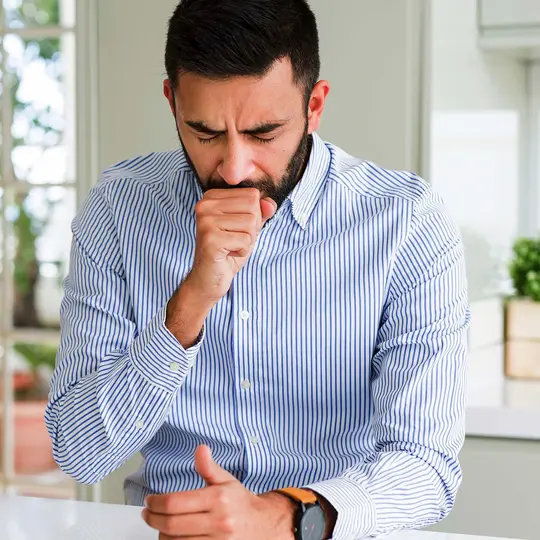1 of 5 / Overview
View All
How Do I Know If I Have COPD?
You must go to a doctor to know for sure whether you have COPD. That’s because there are things to consider for a diagnosis.
What Is Emphysema?
Emphysema is a form of chronic (long-term) lung disease that causes shortness of breath.
Asthma vs. COPD: What's the Difference?
Some people have asthma and COPD at the same time. If you have symptoms of both, your doctor may call it asthma-COPD overlap.
What’s the Prognosis for COPD?
If you’ve been diagnosed with COPD, you might be wondering what comes next. Talk with your doctor to understand what to expect.
2 of 5 / Symptoms & Causes
View All
COPD: What Are the Symptoms?
Many people don’t notice any symptoms of COPD in the early stages. Sometimes there aren’t any.
Emphysema Symptoms
With emphysema, you feel short of breath after the slightest activity. Over time, you may feel breathless even when sitting still.
What to Know About COPD and Cough
An ongoing cough is a symptom of COPD, especially when it comes with mucus. It isn’t pleasant, but there are ways to manage it.
COPD Bloating: Why It Happens and What You Can Do
Bloating of the belly and feeling full very quickly were the most common symptoms of COPD.
3 of 5 / Diagnosis and Stages
View All
COPD and Your Medical Care Team
Who helps you manage your COPD? It’s more than just one doctor. It’s a medical care team.
COPD Stages and the GOLD Criteria
Doctors use stages to describe how severe your COPD is. This system is called the GOLD staging or grading system.
Stage I (Early Stage) COPD
COPD sneaks up on you, taking years to show itself. If you're not paying close attention, the first stage can be easy to miss.
Stage II (Moderate Stage) COPD
By stage II of COPD, your symptoms are usually no longer something you can just shrug off. They start to affect your daily life.
4 of 5 / Treatment & Rehabilitation
View All
What Are the Treatments for COPD?
COPD treatment goal is to help you breathe easier and help regular activities. Medications along with lifestyle approaches can help.
COPD Medications
When you have COPD, medications can go a long way to help you breathe more easily and boost your quality of life.
Your Treatment Choices for Moderate-to-Severe COPD
When you have moderate to severe disease, you and your doctor will work together to find the right therapy for you.
Which Devices Help Treat COPD?
Although there's no cure for COPD, devices like Inhaler, portable oxygen and mobility aids can help you cope with your COPD.
5 of 5 / Living With & Complications
View All
Managing Your Daily Routine With COPD
Daily activities can be a challenge with COPD. It will make it difficult to handle household chores and other day-to-day tasks.
Everyday Tips for Living With COPD
COPD is a challenge, but you have many ways to manage these challenges. Here are some tips for everyday living with COPD.
Talking to Your Family and Friends About COPD
When you open up to those who are closest to you about how COPD affects your life, they better understand what you deal with daily.
Sleep Tips for People With COPD
COPD symptoms can make it hard for you to get a good night's sleep. Here are tips to improve your sleep quality and manage your COPD.
Suggested Reads about COPD
Things That Increase Exacerbation Risk
Smoking and air pollution are well-known causes of COPD flares, but there are other not-so-obvious triggers. Here’s what else can put you at risk.
From Lab to Pharmacy: The Journey to FDA Approval of Mepolizumab (Nucala) for COPD
The FDA has approved mepolizumab (Nucala), a biologic COPD treatment designed to reduce flare-ups. Learn how it works and who it might help.
How to Eat When You Have Trouble Breathing
Find out what you can do to make mealtime easier if you have COPD.
Diagnosing Genetic COPD
Pulmonologists have a list of screening tests they use to diagnose this lung disease, from chest X-rays to throat swabs.
8 million+ Physician Ratings & Reviews
Find Doctors and Dentists Near You
You can also search by physician, practice, or hospital name